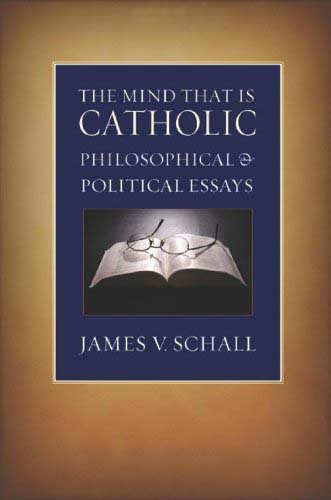 The Mind That Is Catholic The Mind That Is Catholic
Philosophical and Political Essays
James V. Schall
Narrated by Tim Lundeen
Available from Audible
Book published by Catholic University of America Press
James V. Schall is a treasure of the Catholic intellectual tradition. A prolific author and essayist, Schall readily connects with his readers on sundry topics from war to friendship, philosophy, politics, and to ordinary everyday living. In his newest work, The Mind That Is Catholic, he presents a retrospective collection of his academic and literary essays written in the past fifty years. In each essay, he exemplifies the Catholic mind at its best?seeing the whole, leaving nothing out. The Catholic mind seeks to recognize a consistent and coherent relation between the solid things of reason and the definite facts of revelation. Its thought aims to understand how they belong together in a fruitful manner, each profiting from the other; each being what it is. The Catholic mind is not a confusion of disparate sources. It respects and makes distinctions. It sees where things separate. It is in fact delighted by what is. This delightful book is not polemical, but contemplative in mood. Schall shares with readers a mind that is constantly struck by how things fit together when seen in full light. He brings to his work a lifetime of study in political philosophy, a wide-ranging discipline that, in many ways, is the most immediate context in which reason and revelation meet. The Mind That Is Catholic respects what can be known by faith alone. But it also considers what is known by faith to be itself intelligible to a mind actively thinking on political and philosophical things. The whole, at the risk of its own contradiction, does not exclude the intelligibility of what is revealed.
James V. Schall is professor of political philosophy at Georgetown University. He is the author of hundreds of essays on political, theological, literary, and philosophical issues and numerous books including Schall on Chesterton: Timely Essays on Timeless Paradoxes; At the Limits of Political Philosophy: From Brilliant Errors to Things of Uncommon Importance; On the Unseriousness of Human Affairs; and Another Sort of Learning.
|

